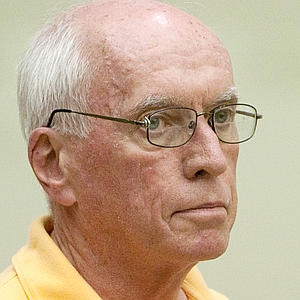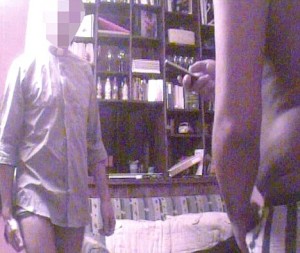Double Lives
Some gay Roman Catholic priests are sexually active, either with a boyfriend or paid or anonymous sex.
Many gay priests are celibate, or strive to be, but are forced to isolate their sexual orientation from their spirituality from their parishioners, diocesan officials and people who know them.
Both types of priests may be loved by the people they minister to and respected members of their community. But they cannot be found out to be gay – celibate or otherwise. The church pretends gay priests don’t exist. This leads them to double lives.
Fr. Kevin J. Gray, 64,the former pastor of Sacred Heart/Sagrado Corazon Church in Waterbury, Connecticut appeared to live humbly. Parishioners thought he had cancer, and admired how he helped Latino immigrants in his largely poor parish. 
But after a routine audit of the church’s finances turned up discrepancies, authorities began a criminal investigation that they say unraveled a secret double life of male escorts, strip clubs and lavish spending on the finest restaurants, luxury hotels and expensive clothing, financed with money stolen from the parish. On July 6, 2010, Fr. Gray was arrested and charged with first-degree larceny.
“About a million,” Gray told authorities without hesitation when asked how much he took from the church account, according to his arrest affidavit.
“Up until this investigation he had an excellent reputation,” police Capt. Christopher Corbett said. “The life he was leading in New York City was much different than the life he was leading in Waterbury as a priest. He’s certainly an example of someone who was leading a double life.”
In an interview with Waterbury cops Gray said “he had grown to hate being a priest and was upset with the archdiocese for the assignments they had given him over the years,” the warrant said.
He was particularly angry about being transferred in 2001 to New Hartford while his mom was dying in New Haven, and said he began stealing from Sacred Heart in 2003 “because he felt that the church owed it to him.”
“Mr. Gray stated that he would order male escorts from Campus Escorts in New York,” the warrant said. “Mr. Gray stated that he is gay and has a problem with the church’s position on homosexuality.”
Two weeks later – another gay priest expose made international news – scenes of sex with strangers and then vesting for Mass a half hour later.
On July 23, 2010 the Italian weekly magazine, Panorama, published a shocking expose called “Le Notti Brave Dei Preti Gay” or “Wild Nights of Gay Priests.” Investigative journalist Carmelo Abbate spent 20 days undercover posing as he boyfriend of a man who frequented gay clerical circles. They secretly videotaped the sexual escapades of three Rome-based priests–two Italians and a Frenchman.
Abbate’s “date” even had sex with one of the priests to corroborate the story. “This is not about homosexuality,” Abbate, who is not gay, told Newsweek. “This is about private vices and public virtues. This is about serious hypocrisy in the Catholic Church.” 
One of the three priests featured in the Panorama article, identified as “Carlo,” asserts that 98% of the priests he knows are gay, and that today’s church is divided between an “intransigent” wing, which Carlo said doesn’t want to face reality, and an “evangelical” wing accepting of homosexual priests.
Cardinal Agostino Vallini, 70, head of the Rome diocese, blasted the three priests in a public statement responding to the Panorama expose: “Priests who are living a double life have not understood what the Catholic priesthood is and should not have become priests. Know that no one forces them to remain priests, exploiting only the benefits. Consistency demands that they be discovered. We do not wish them ill, but we cannot accept that because of their behavior the honor of all the other priests is dragged through the mud.” 
“Before such facts,” the cardinal asserted, “we firmly adhere to what the Holy Father Benedict XVI has repeated several times in recent months: ‘the sins of priests’ call us all back to conversion of heart and life and to be vigilant so as not to ‘pollute the faith and Christian life, damaging the integrity of the Church, weakening her capacity of prophesy and testimony, tarnishing the beauty of her face.'”
Religious commentator, Bryan Cones, managing editor and blogger for the popular magazine, U.S. Catholic, commented: “On this matter, the church’s real problem is the closet. I must agree with the Vicar of Rome that it would be helpful for gay priests to come out–so that we could thank them for their faithful service, especially as they have been unjustly tarred with ‘causing’ sex abuse. Unfortunately, our church leadership at this time is not creating the kind of open and safe space that would allow for such honesty.”
Antagonism to gay men in the priesthood has simmered in the church for centuries. It has been heightened in recent years by some conservative bishops who lay the blame for the sexual abuse crisis on a “homosexual subculture” in the priesthood.
Life in religious communities has long held appeal to gay men and lesbians. Throughout the history of the church, homosexual men and women have found the priesthood and religious life both a refuge and a fulfilling way of life. As Richard John Neuhaus noted (First Things, June-July 2002): “It would seem more than likely that, in centuries past, some priests who have been canonized as saints would meet today’s criteria as having a ‘homosexual orientation.'”
In a January 28, 2005 article in Commonweal, “A Gay Priest Speaks Out,” frankly addressed how the Church’s strict code of silence leads to priests – celibate and not – living double lives.
“Bishops and religious superiors,” he said, “have forbidden many priests from speaking, writing or preaching about their homosexuality. Gay priests like myself are caught in a double bind. If we speak the truth and freely discuss our existence in the church, and more important, our experience of leading fulfilling lives as celibate men, we will be censured or removed from ministry. If we remain silent, though, we guarantee that the positive example of the celibate gay priest will remain hidden. Voiceless, the gay priest cannot defend himself within the church. Stereotyped, he cannot escape the suspicions of society at large.”
“To take one example,” he said, “I have often wanted to remind my parishioners that media coverage of the sexual abuse crisis portraying all gay priests as abusers was inaccurate and unjust. But I could not offer convincing arguments or testimony without admitting I knew gay priests or happened to be one myself.”
“If the Incarnation shows us anything, it is the God loves us in our humanity, even in our weakness, as St. Paul says–especially in our weakness. We all have a need to see ourselves as loved by God as we are, even in those parts of ourselves that embarrass or sadden us. Perhaps we think ourselves too plain, too unintelligent, too untalented, or too unsuccessful to warrant God’s love. But God’s love is always far greater than we can imagine, and embraces our entire selves.”
“In my own life, one of the most profound experiences of God’s love when, after many years, I finally accepted that I would not change myself into a straight man: I was gay and that was simply the way God had created me. Encountering God’s love as I am was a transforming experience, one that I have wanted to share with parishioners not as an example of any personal sexual liberation, but as a sign of God’s infinite and always surprising, understanding.”
“I have long hoped to testify before my parish to this foundational experience of God’s love in my life, but I am of course forbidden to do so. And when a minister of the Word cannot publicly proclaim the freedom that the Word brings to his own life, it is a real loss for a community of faith.”
